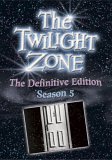| Reviews & Columns |
|
Reviews DVD TV on DVD Blu-ray 4K UHD International DVDs In Theaters Reviews by Studio Video Games Features Collector Series DVDs Easter Egg Database Interviews DVD Talk Radio Feature Articles Columns Anime Talk DVD Savant Horror DVDs The M.O.D. Squad Art House HD Talk Silent DVD
|
DVD Talk Forum |
|
|
| Resources |
|
DVD Price Search Customer Service #'s RCE Info Links |
|
Columns
|
|
|
Twilight Zone - Season 5 (The Definitive Edition), The
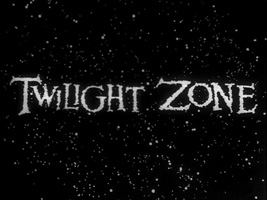
INTRODUCTION:
"You unlock this door with the key of imagination. Beyond it is another dimension, a dimension of sound, a dimension of sight, a dimension of mind. You're moving into a land of both shadow and substance, of things and ideas. You've just crossed over into the Twilight Zone."
Much like its brief flirtation with videotaped episodes in the second season, The Twilight Zone's experiment with the hour-long format had been a dismal failure; so, for its fifth and final season, the landmark series returned to the familiar. Not only did the show resume its half-hour timeframe, but Serling's on-set "Whip Pan" introductions were back, and many successful stars of earlier episodes made a return to the land of both shadow and substance. Without producer Buck Houghton at the helm and Serling's creativity tank nearing empty, The Twilight Zone's fifth season lacks the consistent power and charm of the first three, but it is still a significant improvement over the fourth. With wonderful stories like "Nightmare at 20,000 Feet" and "Number Twelve Looks Just Like You", the final season of this groundbreaking series contains some of its most classic episodes. It also marks some unique events in the history of the show, including its only female writer, its only female director, the only time someone who starred in an episode also directed one, and finally, the only time the series aired a story not produced specifically for the show. With the conclusion of the season, it was clear that the time had come for The Twilight Zone to finish its run, but there were still many stories of merit produced, and those closing 36 episodes are presented here in the final installment of Image Entertainments "definitive" editions.
CONTENT:
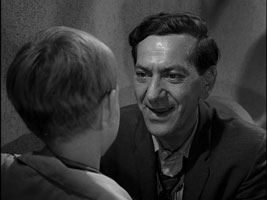 The Twilight Zone's final season opens with a strong story from Rod Serling himself and starring two of the show's most seasoned veterans. Jack Klugman ("A Passage for Trumpet", "A Game of Pool", and "Death Ship") portrays Max Phillips, an alcoholic bookie who has just been informed that his son Pip (Bill Mumy -- "Long Distance Call", "It's a Good Life") was critically wounded during military operations in South Vietnam. Upon hearing of this information, he takes a stand against his boss and is shot for his troubles, and as he clings to life, he gets a chance to relive some of his fondest moments with his son. Unlike "Death Ship", Klugman is perfectly cast in this role of a basically decent man who has made some poor choices and is very remorseful about his failures as a father. Mumy is also excellent as the lovable yet somewhat creepy apparition. While a tad overly sentimental, "In Praise of Pip" marks a good solid start to this fifth season.
The Twilight Zone's final season opens with a strong story from Rod Serling himself and starring two of the show's most seasoned veterans. Jack Klugman ("A Passage for Trumpet", "A Game of Pool", and "Death Ship") portrays Max Phillips, an alcoholic bookie who has just been informed that his son Pip (Bill Mumy -- "Long Distance Call", "It's a Good Life") was critically wounded during military operations in South Vietnam. Upon hearing of this information, he takes a stand against his boss and is shot for his troubles, and as he clings to life, he gets a chance to relive some of his fondest moments with his son. Unlike "Death Ship", Klugman is perfectly cast in this role of a basically decent man who has made some poor choices and is very remorseful about his failures as a father. Mumy is also excellent as the lovable yet somewhat creepy apparition. While a tad overly sentimental, "In Praise of Pip" marks a good solid start to this fifth season.
Richard Matheson, arguably the show's most consistent writer, contributes the next two scripts, first with "Steel", a story about a time when boxing competitors have been replaced by lifelike androids. In this effort, Lee Marvin ("The Grave") returns to the Zone as Steel Kelly, a former heavyweight from the days of human fighters who now "manages" a relic of a robot fighter called "Battling Maxo". Maxo is outdated and outclassed, and promoters simply aren't interested in paying for his services, but in order to effect the necessary repairs, he must not only find a fight but remain on his feet long enough to get paid. While the crux of the story defies some basic logic, William Tuttle's makeup for the robot faces is downright disturbing, and Marvin's performance in the lead is fantastic.
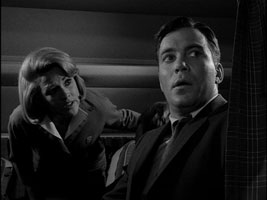 "Nightmare at 20,000 Feet" marks the return of William Shatner ("Nick of Time") and a reunion with Matheson as writer. Bob Wilson (Shatner) has recently recovered from a nervous breakdown suffered during a plane flight six months ago, and as a final test of full recovery, his doctors have allowed him to fly home with his wife (Christine White). Everything proceeds as one would expect until Wilson looks out the window and sees a monster standing on the wing tearing apart one of the cowling plates mid-flight. In classic Twilight Zone form, he is witnessing something that defies description, and yet none of the other crew members or passengers have seen what he has: Serling's "fear of the unknown working on you, which you cannot share with others." Is he having another breakdown? Or is something terrible about to happen on this flight? Shatner's strong performance in "Nick of Time" was one of the best during the second season, and here he elevates his game to even higher levels with a wonderfully intense and realistic portrayal of a man who is unsure of his own sanity. Skillfully directed by Richard Donner (the first of six Twilight Zones for the future big screen director), "Nightmare at 20,000 Feet" is a reminder of what the series was like at its absolute best, and it remains a classic to this day. The only drawback is the dreadfully silly costume donned by the gremlin outside, but when the performances and story are as in sync as they are here, it is easy to suspend such disbeliefs.
"Nightmare at 20,000 Feet" marks the return of William Shatner ("Nick of Time") and a reunion with Matheson as writer. Bob Wilson (Shatner) has recently recovered from a nervous breakdown suffered during a plane flight six months ago, and as a final test of full recovery, his doctors have allowed him to fly home with his wife (Christine White). Everything proceeds as one would expect until Wilson looks out the window and sees a monster standing on the wing tearing apart one of the cowling plates mid-flight. In classic Twilight Zone form, he is witnessing something that defies description, and yet none of the other crew members or passengers have seen what he has: Serling's "fear of the unknown working on you, which you cannot share with others." Is he having another breakdown? Or is something terrible about to happen on this flight? Shatner's strong performance in "Nick of Time" was one of the best during the second season, and here he elevates his game to even higher levels with a wonderfully intense and realistic portrayal of a man who is unsure of his own sanity. Skillfully directed by Richard Donner (the first of six Twilight Zones for the future big screen director), "Nightmare at 20,000 Feet" is a reminder of what the series was like at its absolute best, and it remains a classic to this day. The only drawback is the dreadfully silly costume donned by the gremlin outside, but when the performances and story are as in sync as they are here, it is easy to suspend such disbeliefs.
The season continues with two more scripts from Serling, "A Kind of Stopwatch" and "The Last Night of a Jockey". In "Stopwatch", Richard Erdman delivers a surprisingly funny performance in the face of a relatively silly script. Patrick Thomas McNulty (Erdman) is a friendless bore who is constantly talking up a storm and forcing the most ridiculous business ideas on his employer. When ultimately fired for his actions, he meets a mysterious man named Potts (Leon Belasco), who kindly gives him a watch that has the power to freeze time. Thematically a retread of "Time Enough at Last", "A Kind of Stopwatch" lacks in both heart and logic. How McNulty gets the watch from Potts is lazy writing, and what he does with this newfound power doesn't make much sense. In an exercise of awkward direction and over-the-top silliness, McNulty uses his stopwatch to freeze various events from the stock footage archives: a herd of cattle, a tree falling, water ski jumpers, and an airplane crashing into a barn! Worse, while Erdman creates a somewhat humorous character, he is not particularly likeable, and the audience simply does not care what happens to him in the end.
"The Last Night of a Jockey" switches tone entirely with a dark story of Grady (Mickey Rooney), a washed up horse jockey who has been banned from the Sport of Kings for various forms of cheating. Originally slated to direct an episode instead of star in one, Rooney performs a strong one-man show where he is left alone in a small apartment to argue with his inner consience. Here he is forced to take stock of his life and face the truth he has been unwilling to admit to himself. While Rooney gives a solid performance, it is a little too crusty and loud, and Serling's conclusion is an ironic but largely unsatisfying twist.
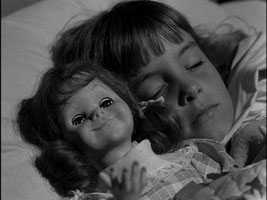 Jerry Sohl, who penned "The New Exhibit" for the hour-long episodes, contributes two scripts for the final season, the first of which is "Living Doll" (based on a premise by Charles Beaumont). Another classic, Sohl's script concerns Erich Streator (Telly Savalas), a grumpy penny pincher who is angry with his wife (Mary LaRoche) for buying an extravagant talking doll for his step-daughter Christie (Tracy Stratford). However, "Talky Tina" isn't your ordinary talking doll. This one seems to have a life of its own, and as Streator grows more angry, the doll protects its child owner by verbally taunting the disbelieving man. Where this episode succeeds most is the level of realism in the script. Confronted with the unreasonable, Streator makes a serious of very logical assumptions about what is happening to him, believing perhaps that his wife has planted a walkie talkie inside the doll. Instead of simply freaking out over the situation, he responds in a reasonable manner. Also effective is the voice of "Tina", delivered in a very happy but creepy way by voice legend June Foray. The ultimate resolution is nearly ruined by terrible editing (no surprise that Richard C. Sarafian only directed one episode), but it is a satisfying and disturbing conclusion.
Jerry Sohl, who penned "The New Exhibit" for the hour-long episodes, contributes two scripts for the final season, the first of which is "Living Doll" (based on a premise by Charles Beaumont). Another classic, Sohl's script concerns Erich Streator (Telly Savalas), a grumpy penny pincher who is angry with his wife (Mary LaRoche) for buying an extravagant talking doll for his step-daughter Christie (Tracy Stratford). However, "Talky Tina" isn't your ordinary talking doll. This one seems to have a life of its own, and as Streator grows more angry, the doll protects its child owner by verbally taunting the disbelieving man. Where this episode succeeds most is the level of realism in the script. Confronted with the unreasonable, Streator makes a serious of very logical assumptions about what is happening to him, believing perhaps that his wife has planted a walkie talkie inside the doll. Instead of simply freaking out over the situation, he responds in a reasonable manner. Also effective is the voice of "Tina", delivered in a very happy but creepy way by voice legend June Foray. The ultimate resolution is nearly ruined by terrible editing (no surprise that Richard C. Sarafian only directed one episode), but it is a satisfying and disturbing conclusion.
Five straight Serling scripts follow, and not a single one of them is particularly good. "The Old Man in the Cave" brings John Anderson ("A Passage for Trumpet", "The Odyssey of Flight 33", "Of Late I Think of Cliffordville") back in a strange role as Mr. Goldsmith, one of many post-apocalyptic survivors who takes his daily instructions from "The Old Man in the Cave". James Coburn costars effectively as Major French, a military man who has come to their small town to begin to restore organized civilization. Overly talkative and mostly pointless, Serling's adaptation of Henry Slesar's original short story carries little weight.
"Uncle Simon", starring Cedric Hardwicke in the title role and Constance Ford as his servant Barbara, is perhaps the most shrill and annoying of the 156 episodes in the series. Disappointingly, the concept for the story could be an interesting one, but the script itself is woefully verbose, the way the episode is staged is painfully bad, and the performances are so loud and obnoxious that it is impossible to care for a moment what happens to either of these unlikeable characters. Even the score is terrible, with its loud and overbearing beats. Not much better is "A Short Drink from a Certain Fountain", starring Patrick O'Neal as an aging man who injects himself with a youth serum to keep his younger wife (Ruta Lee) from leaving him. Less shrill than "Uncle Simon", it shares the primary flaw that these characters are neither likeable nor interesting, and so we do not really care how their lives turn out in the end.
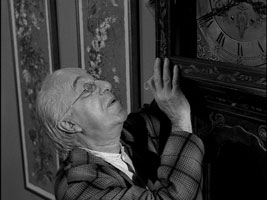 Reminiscent of the third season premiere "Two", "Probe 7 -- Over and Out" tells the tale of an astronaut who is stranded on a lonely distant planet when nuclear war breaks out back home. Here he meets an alien woman who speaks a language that is foreign to him, and the two struggle to form a bond on this strange world. A little obvious and heavy-handed, Richard Basehart and Antoinette Bower are effective enough in the leads that it isn't a total disaster. This episode is followed by "The 7th is Made Up of Phantoms", an uninspired story of three National Guardsmen who stumble into the past at the same time and location of General Custer's 7th Cavalry. That two of these three men are virtual experts on everything having to do with this historic event is just one of the flaws in this uninvolving tale.
Reminiscent of the third season premiere "Two", "Probe 7 -- Over and Out" tells the tale of an astronaut who is stranded on a lonely distant planet when nuclear war breaks out back home. Here he meets an alien woman who speaks a language that is foreign to him, and the two struggle to form a bond on this strange world. A little obvious and heavy-handed, Richard Basehart and Antoinette Bower are effective enough in the leads that it isn't a total disaster. This episode is followed by "The 7th is Made Up of Phantoms", an uninspired story of three National Guardsmen who stumble into the past at the same time and location of General Custer's 7th Cavalry. That two of these three men are virtual experts on everything having to do with this historic event is just one of the flaws in this uninvolving tale.
"Ninety Years Without Slumbering" features both a first-time (and only time) writer and director for The Twilight Zone. Originally a script by the talented George Clayton Johnson entitled "Tick of Time", "Ninety Years" was retooled and rewritten by Richard deRoy much to Johnson's dismay. Loveable entertainer Ed Wynn ("One for the Angels") stars as Sam Forstmann, an aging clocksmith who is convinced than when the grandfather clock he has owned since birth stops ticking, he too will die. Wynn is really exceptional in the role, and he carries the piece admirably, but the story does not follow a particularly logical progression, and by the end it becomes difficult to swallow the resolution. Still, it is worth watching if only to see Wynn's performance.
For some curious reason, Earl Hamner, Jr. was asked to write five stories for this final season, including the next two episodes. While "Jess-Belle" was one of the few bright spots of the hour-long episodes, most of the credit for that success should be attributed to the wonderfully nuanced performance by Anne Francis. Combined with the weak points of "The Hunt" and "A Piano in the House", it is difficult to understand why Hamner was given the second largest script allotment of the season. The first of these is "Ring-a-Ding Girl", which focuses on Bunny Blake (Maggie McNamara), a celebrated film actress who receives a mysterious magical ring in the mail that instructs her to return to her small hometown of Howardville. Without much coherency, the plot is driven by the ring giving her cryptic messages as the audience is misdirected down a path to the ultimate conclusion. With better writing, the concept could have worked, but it doesn't.
Hamner's second script for the season, "You Drive", stars Edward Andrews, who previously delivered a great performance in "Third From the Sun". Here he plays a weary man, beaten down by the pressures of work, who gets distracted while driving home one day and hits the local paperboy with his car. After fleeing the scene of the crime, he is haunted not only by his guilt but by his car. There is some clever camerawork in this episode that creates a nice uneasy feeling, but it is hard to avoid the feeling that we have been down this path already with "The Fever" and "A Thing About Machines".
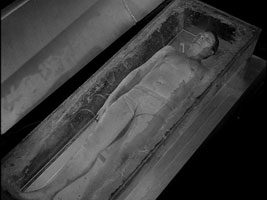 Clearly inspired by O. Henry's classic tale The Gift of the Magi, "The Long Morrow" is one of Serling's better script efforts of the season. Commander Douglas Stansfield (Robert Lansing) is about to embark on a journey into the outer reaches of space. While en route, he will be placed in suspended animation, so when he returns home -- some 40-ish years later -- the world he knows will have aged, and he will be a relic of the past. Enter Sandra Horn (Mariette Hartley), a woman he meets shortly before his journey but falls madly in love with. Both of them understand the importance of his mission, so he leaves her behind despite his feeling, but when he returns from his trip, both of them find unexpected results. The dialogue is a little too wordy, and it's annoying how Hartley is always filmed with a distracting soft camera filter, but the payoff makes the journey worth it.
Clearly inspired by O. Henry's classic tale The Gift of the Magi, "The Long Morrow" is one of Serling's better script efforts of the season. Commander Douglas Stansfield (Robert Lansing) is about to embark on a journey into the outer reaches of space. While en route, he will be placed in suspended animation, so when he returns home -- some 40-ish years later -- the world he knows will have aged, and he will be a relic of the past. Enter Sandra Horn (Mariette Hartley), a woman he meets shortly before his journey but falls madly in love with. Both of them understand the importance of his mission, so he leaves her behind despite his feeling, but when he returns from his trip, both of them find unexpected results. The dialogue is a little too wordy, and it's annoying how Hartley is always filmed with a distracting soft camera filter, but the payoff makes the journey worth it.
"The Self-Improvement of Salvadore Ross" employs yet another one-time Zone writer, Jerry McNeely, in the tale of a man (Don Gordon -- "The Four of Us are Dying") who finds that he can trade ailments and even years of his life with other people. While the main plot itself is a bit too convenient and not particularly involving, the premise does point out the relative importance we place on life. Meeting a wealthy old man, Ross is easily able to trade 46 years of his life in exchange for the man's fortune. In contrast, buying 1 year at a time from youngsters who have not learned to value their years becomes a significantly less expensive transaction. It is unfortunate that this concept was not used to support a more interesting overall plot.
Charles Beaumont's second story idea that had to be written by someone else while his health declined is "Number Twelve Looks Just Like You", from John Tomerlin. In the spirit of "The Eye of the Beholder", "Number Twelve" is about the nature of beauty and the demand for conformity. Collin Wilcox, fresh off her performance in To Kill a Mockingbird, stars as a girl of 19 years in a society where everyone has undergone surgery to physically look like a limited number of accepted-as-beautiful human models. When she decides she wishes to retain her own physical characteristics, her family becomes concerned about why she has such strange thoughts that do not conform with what everyone else wants. Creatively staged, the numerous characters in this piece are played by only a handful of actors. As everyone looks like everyone else, it makes perfect sense, and it creates a disturbing reality. Wilcox is excellent in the lead and portrays her character on a nice subdued level, but the episode is a tad heavy-handed in its approach.
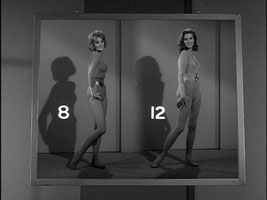 Two of the next three episodes are just plain awful in ways that almost cannot be described. Another weak effort from Earl Hamner, Jr., "Black Leather Jackets" is a senseless tale of a group of three motorcyclists who are really aliens preparing to poison humanity's water supply. When one of the three falls in love with the girl next door (Shelley Fabares), he decides that perhaps invasion isn't the best of ideas. Nearly everything in this episode defies credibility, and it registers as a silly and pointless exercise. Shockingly, "From Agnes -- With Love" is even worse. Written by Bernard C. Schoenfeld (one of his last credits), "From Agnes" is a predictable and annoying story about a hapless computer programmer who is manipulated by a computer that falls in love with him. It falls flat on every level and is neither comedy nor drama ... nor entertaining.
Two of the next three episodes are just plain awful in ways that almost cannot be described. Another weak effort from Earl Hamner, Jr., "Black Leather Jackets" is a senseless tale of a group of three motorcyclists who are really aliens preparing to poison humanity's water supply. When one of the three falls in love with the girl next door (Shelley Fabares), he decides that perhaps invasion isn't the best of ideas. Nearly everything in this episode defies credibility, and it registers as a silly and pointless exercise. Shockingly, "From Agnes -- With Love" is even worse. Written by Bernard C. Schoenfeld (one of his last credits), "From Agnes" is a predictable and annoying story about a hapless computer programmer who is manipulated by a computer that falls in love with him. It falls flat on every level and is neither comedy nor drama ... nor entertaining.
The final two episodes from the great Richard Matheson are "Night Call" and "Spur of the Moment". Bringing Gladys Cooper ("Nothing in the Dark", "Passage on the Lady Anne") back to The Twilight Zone, "Night Call" is an unsettling piece that focuses on an elderly disabled woman who continues to receive mysterious phone calls after a late night storm. At first, when she answers the phone, it seems as there is no one on the other end of the line, but slowly, a haunting voice does emerge, and it terrorizes her until the episode's haunting conclusion. With a great performance in the lead and skillful direction by Jacques Tourneur, it is one of the better episodes of the season. Not as effective is "Spur of the Moment". Matheson's script is really clever, but the direction and performances are way over the top, and Diana Hyland is downright shrill in the lead. Anne Henderson (Hyland) is a young affluent woman who is chased on horseback by a mysterious woman in black. Who this woman is and why she is chasing Anne are interesting revelations, but the performances of all involved make it so that we don't really care.
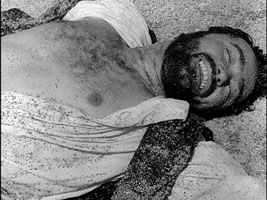 Faced with major budget problems, the show's final producer, William Froug, found an innovative solution to his problems. He purchased the rights to the French short film La Rivière du Hibou, based on Ambrose Bierce's classic tale An Occurrence at Owl Creek Bridge. The piece had won the short film Palme D'Or at the 1962 Cannes Film Festival and was perfectly suited to The Twilight Zone, even more so than many of the scripts being produced in-house. Set during the American Civil War, Union soldiers are preparing to execute a Confederate spy by hanging him off a bridge. At the moment of his drop, however, the rope breaks, and the man makes a break for his freedom, rediscovering his love for simply being alive. With almost no dialogue, save Serling's closing narration, this is an incredibly powerful piece that is beautifully shot and marks one of the highest points of the entire five-year run. It's no surprise the film subsequently went on to win an Oscar as well.
Faced with major budget problems, the show's final producer, William Froug, found an innovative solution to his problems. He purchased the rights to the French short film La Rivière du Hibou, based on Ambrose Bierce's classic tale An Occurrence at Owl Creek Bridge. The piece had won the short film Palme D'Or at the 1962 Cannes Film Festival and was perfectly suited to The Twilight Zone, even more so than many of the scripts being produced in-house. Set during the American Civil War, Union soldiers are preparing to execute a Confederate spy by hanging him off a bridge. At the moment of his drop, however, the rope breaks, and the man makes a break for his freedom, rediscovering his love for simply being alive. With almost no dialogue, save Serling's closing narration, this is an incredibly powerful piece that is beautifully shot and marks one of the highest points of the entire five-year run. It's no surprise the film subsequently went on to win an Oscar as well.
Jerry Sohl contributes his final script with "Queen of the Nile", a dull and obvious tale of a woman, Pamela Morris (Ann Blyth) who has retained her beauty over centuries of life by stealing the life forces of unsuspecting victims. Somewhat similar in tone to "Long Live Walter Jameson", it's disappointing to see that four years later, the special effects makeup is actually worse. In an awkward bit of casting, Austrian actress Celia Lovsky (incidentally, the 7th cast member from "Amok Time", as legendary T'Pau, to appear on The Twilight Zone) portrays Morris's daughter with an incredibly thick Viennese accent, yet her "mother" speaks perfect and polished English.
"What's in the Box" marks the first of two scripts submitted late into the show's run by Martin M. Goldsmith and the only directorial effort by the previously dependable Richard L. Bare. Essentially the same story as "A Most Unusual Camera", this episode stars Uncle Charley O'Casey himself, William Demarest, as a cab driver who loves to watch television. After delivering a tirade to the local television repair man, his set begins to reveal the future, including what his wife (Joan Blondell) will do when she finds out that he's been cheating on her with another woman. Demarest is solid in his performance, but there is no heart of substance to the story, the bickering between the characters becomes tiresome, and the conclusion is hollow.
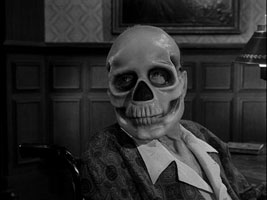 Three more Serling scripts follow, first with "The Masks", a nicely executed story about a wealthy dying man who invites all the heartless vultures surrounding his death bed to join him in a mask-wearing ceremony at Mardi Gras. If they keep his specially made masks on until midnight, they will each get to split his massive fortune upon his death. Serling's script focuses on the ugliness and vanity within people, and William Tuttle's makeup is very unsettling. Of note, "The Masks" was directed by Ida Lupino, the only female director during the show's five years and the only person who previously starred in an episode ("The Sixteen-Millimeter Shrine") to go on to direct one.
Three more Serling scripts follow, first with "The Masks", a nicely executed story about a wealthy dying man who invites all the heartless vultures surrounding his death bed to join him in a mask-wearing ceremony at Mardi Gras. If they keep his specially made masks on until midnight, they will each get to split his massive fortune upon his death. Serling's script focuses on the ugliness and vanity within people, and William Tuttle's makeup is very unsettling. Of note, "The Masks" was directed by Ida Lupino, the only female director during the show's five years and the only person who previously starred in an episode ("The Sixteen-Millimeter Shrine") to go on to direct one.
Serling's next two scripts, however, are not so nicely executed. "I am the Night -- Color Me Black" showcases the return of the preachy Serling who had shown his face throughout previous seasons. On the morning of a town hanging, the sky has remained pitch black despite the hour of the day. Ostensibly, the sky is black because of all the hatred in the world, and this message is hammered home with a ridiculous amount of exposition, including the town Reverend just to make it worse. "Sounds and Silences" stars noted character actor John McGiver ("The Bard") as Roswell G. Flemington, a mentally unstable man who is obsessed with the sea, modeling his home and office after the deck and quarters of a ship. He loves blaring the loud sounds of naval vessels, but he becomes dismayed when every sound he hears is magnified in volume tenfold. Intended to be played for comedy, this episode is simply loud and annoying. Thankfully, because of litigation from another writer's work with a similar title, the episode has rarely been seen in syndication.
Credited as "A.T. Strassfield" (something that occurred often at the time), "Caesar and Me" marks the only Twilight Zone to be written by a woman. How much she actually wrote and how much was written by producer William Froug is unknown, but it is of little consequence as the episode retreads territory already covered in "The Dummy". Jackie Cooper delivers a fantastic performance as the down-on-his-luck ventriloquist who is suckered into a life of crime by his wooden dummy, but the episode itself has little point.
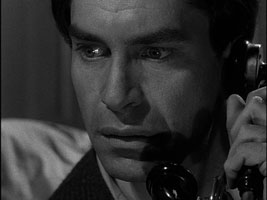 Martin Landau ("Mr. Denton on Doomsday") returns, this time in a starring role, in "The Jeopardy Room". As Major Ivan Kuchenko, a defector from a country of "unspecified origin" (riiiight ... Ivan ... Kuchenko), he is trapped in a tiny hotel room by an assassin who intends to kill him. Much like the second season's "The Silence", this story is better suited for a show like Afred Hitchcock Presents, but it works fine in this capacity. The assassin (John van Dreelen) has planted a bomb in the room, and Kuchenko has three hours to find it. In searching for the bomb, he could set it off, but if he does not search, he will be shot by a sniper in a nearby building. A tense story, it is somewhat undermined by the unnecessary interaction between the assassin and his dim-witted assistant Boris (Robert Kelljan).
Martin Landau ("Mr. Denton on Doomsday") returns, this time in a starring role, in "The Jeopardy Room". As Major Ivan Kuchenko, a defector from a country of "unspecified origin" (riiiight ... Ivan ... Kuchenko), he is trapped in a tiny hotel room by an assassin who intends to kill him. Much like the second season's "The Silence", this story is better suited for a show like Afred Hitchcock Presents, but it works fine in this capacity. The assassin (John van Dreelen) has planted a bomb in the room, and Kuchenko has three hours to find it. In searching for the bomb, he could set it off, but if he does not search, he will be shot by a sniper in a nearby building. A tense story, it is somewhat undermined by the unnecessary interaction between the assassin and his dim-witted assistant Boris (Robert Kelljan).
In another Earl Hamner, Jr. script, "Stopover in a Quiet Town" takes the basic concept of "Where is Everybody?" and replaces the convincing Earl Holliman with a bickering married couple. Bob (Barry Nelson) and Millie Frazier (Nancy Malone) wake up after a night of drinking in a strange room in a strange town. As they explore their surroundings, they find that there are no other people to be found, and stranger still, it seems that none of the objects in the town are actually real. While moderately entertaining, "Stopover" is very predictable and feels like someone going through a checklist of the elements he thinks should be in a Twilight Zone episode.
Martin W. Goldsmith's second and final script is much stronger than his work on "What's in the Box". A two-person piece, "The Encounter" stars Neville Brand as a World War II veteran (Brand himself was a heavily decorated war hero) named Fenton who harbors considerable guilt over what he did in the war. When a nearby gardener, Taro (George Takei), stops by looking for work, the two share an afternoon in his attic addressing prejudice, bigotry, and guilt. The two stars give spot-on performances, but the one failing is that Fenton's guilt is his own while Taro's if for his father. This discrepancy renders some of the interaction less meaningful, but it is still an intriguing piece.
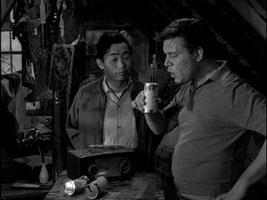 One of Serling's stronger scripts in this season comes from an unpublished idea by Mike Korologos, "Mr. Garrity and the Graves". Garrity (John Dehner -- "The Lonely", "The Jungle") is a traveling stranger who comes upon Happiness, Arizona and offers to raise the dead, specifically the 128 people who died before the Sheriff restored order and changed the name of the town. After ostensibly bringing a dog back to life, everyone believes in his mystical power, but as he begins to perform the act, they realize that they don't want these people back in their town after all. With a clever plot that would have been even better without a trademark Twilight Zone twist that seems tacked on at the end, this is a fun episode that entertains nicely.
One of Serling's stronger scripts in this season comes from an unpublished idea by Mike Korologos, "Mr. Garrity and the Graves". Garrity (John Dehner -- "The Lonely", "The Jungle") is a traveling stranger who comes upon Happiness, Arizona and offers to raise the dead, specifically the 128 people who died before the Sheriff restored order and changed the name of the town. After ostensibly bringing a dog back to life, everyone believes in his mystical power, but as he begins to perform the act, they realize that they don't want these people back in their town after all. With a clever plot that would have been even better without a trademark Twilight Zone twist that seems tacked on at the end, this is a fun episode that entertains nicely.
"The Brain Center at Whipple's" is another Serling script, but this one is another that strays too far in to preaching territory. Great character actor Richard Deacon (most famous as Mel Cooley on The Dick Van Dyke Show) stars as Wallace V. Whipple, the CEO of a factory who becomes convinced that replacing manpower with machine power is more economical and efficient. Without much more premise than that, the story drags in spite of Deacon's competent performance, and by the end there is very little substance to it other than the obvious and heavy-handed message about the value of man over machine.
Richard Donner's final directorial effort for the series follows in "Come Wander with Me", a strange folk tale that stars Gary Crosby (Bing's son) as Floyd Burney, "The Rockabilly Boy". Burney is a big city singer who has journeyed to some backwoods territory in search of the next great undiscovered folk song. While venturing off into the woods, he comes across a mysterious woman (Bonnie Beecher) who speaks in riddles and hums a beautiful melody. Clumsily directed with little coherency, the story meanders around until it stumbles into its unsatisfying and seemingly pointless conclusion.
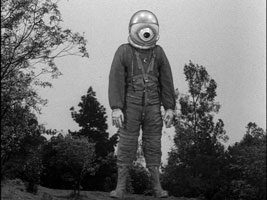 The last Rod Serling script to air as part of his Twilight Zone is titled "The Fear" and is yet another two-person piece, this time about a state trooper (Peter Mark Richman) and a downward-looking fashion editor (Hazel Court) who are caught alone together on a night where strange things are happening outside. Through their analysis, it becomes clear that aliens are manipulating the world around them, and the tale is as much about their encounter as how they handle their own fear. "The Fear" is a decent enough story in the vein of traditional Twilight Zone tales, but the script comes across as unnatural, and the characters are almost indistinguishable, both sounding way too much like Serling himself were delivering the lines.
The last Rod Serling script to air as part of his Twilight Zone is titled "The Fear" and is yet another two-person piece, this time about a state trooper (Peter Mark Richman) and a downward-looking fashion editor (Hazel Court) who are caught alone together on a night where strange things are happening outside. Through their analysis, it becomes clear that aliens are manipulating the world around them, and the tale is as much about their encounter as how they handle their own fear. "The Fear" is a decent enough story in the vein of traditional Twilight Zone tales, but the script comes across as unnatural, and the characters are almost indistinguishable, both sounding way too much like Serling himself were delivering the lines.
Sadly, The Twilight Zone ends on just about the lowest note possible with Earl Hamner, Jr.'s final contribution to the series and one of the worst of the show's entire run. "The Bewitching Pool" concerns an upper-class married couple preparing to get divorced and informing their children of the changing circumstances. The kids are opposed to this, so naturally, they swim to the bottom of their pool and into another world where a mysterious "Earth Mother" (Georgia Simmons) lets them eat cake all day. A not-so-subtle statement from Hamner that cityfolk are awful when compared to the kind people in the country, "The Bewitching Pool" is a waste of time.
Often maligned as the worst season of The Twilight Zone, this fifth season certainly has its share of awful half-hours, but there are numerous outstanding episodes, and it is a significant step up from the previous season. Many newcomers joined the series as writers and directors, and most of them were unsuccessful, but Serling and Matheson both brought their best effort to the table for a few episodes each, and "An Occurrence at Owl Creek Bridge" stands strong as one of the best episodes to ever air under The Twilight Zone name. While only the fourth best season out of five, this fifth season has enough solid episodes in it to make it worthy of the show's great legacy.
PRESENTATION:
This "definitive edition" of the fifth season of The Twilight Zone is presented very much like the fourth season. Once again, the episodes are presented in their entirety, but the closing advertisements for other network shows are no longer present, nor are the nostalgic public service announcements. Also, there are no instances of Serling acting as a corporate shill for the "too mild to filter" cigarettes of the previous seasons. Essentially, the episodes are presented without any extra material, save for a bumper at the halfway point. Before the credits, Serling returns as always to promote the upcoming episode (except on "You Drive", "Night Call", "Stopover in a Quiet Town", and "The Fear"). The short preview clips that were used in the fourth season are gone. One noteable change from the other seasons is that the credits themselves now often have corporate advertisements built within them. This can be seen on "The Last Night of a Jockey", "Probe 7 -- Over and Out", "Black Leather Jackets", "An Occurrence at Owl Creek Bridge" (blasphemy!), "The Sound and the Silence" and "The Jeopardy Room".
Like the original broadcasts, this fifth season release is in a 4:3 aspect ratio with a mono audio track. As with other seasons, the episodes have been re-mastered, but it appears that the level of care given to these re-masters was much lower than with the first four releases. Many episodes exhibit noticeable video problems, including print damage and significant dirt, and the overall quality is lacking when compared with the stellar efforts we have come to expect with this "definitive" series. To drop the ball at the finish line is a real disappointment. The episodes still look better than they ever have, and that is certainly appreciated, but considering what we have seen before, I suspect they could look even better than this.
Some more screenshots:
| Old | New |
|---|---|
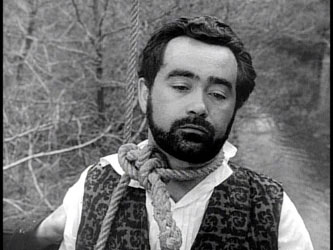 | 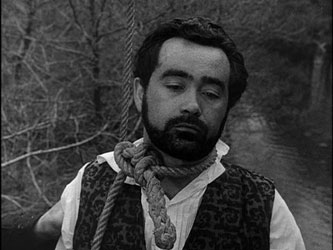 |
| Old | New |
|---|---|
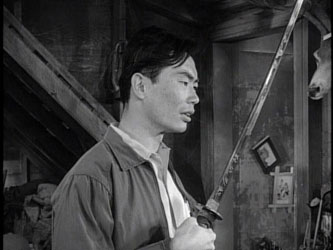 | 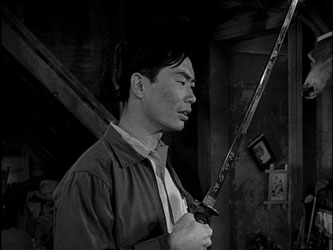 |
| Old | New |
|---|---|
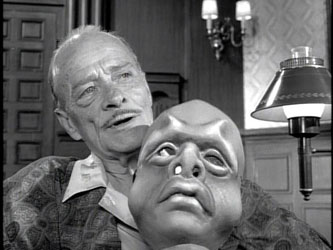 | 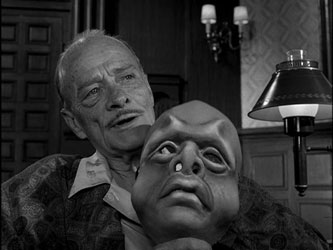 |
| Old | New |
|---|---|
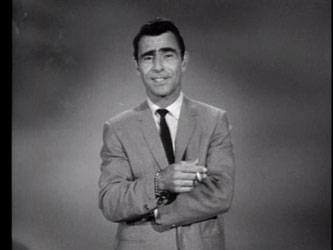 | 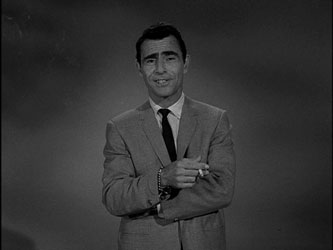 |
The menus are organized in the same simple format as the first four seasons. The montage of the series' classic moments runs once in the background of the main menu, and everything is easily selectable from the start. Each episode's menu has a scene selection screen that is well organized as well as a link to special features. Still missing is a "Play All" feature, but that is a minor oversight in an otherwise great layout.
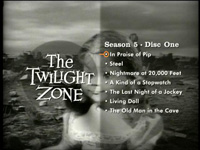 | 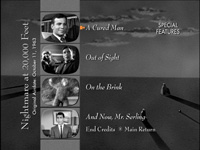 | 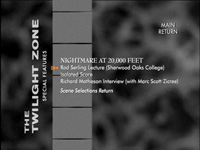 |
Of note, the episodes are closed captioned for the hearing impaired, but not the special features.
WHISTLES & BELLS:
This release of the fifth season includes mostly the same style of features as the first four releases: audio commentaries from the episodes' stars, recently produced radio dramas, and isolated scores from various composers. The interview material has continued the evolution begun with the previous release, and Marc Scott Zicree's awkward audio recordings have now been completely replaced by newly filmed video interviews, often with him as the interviewer. Also, there is a return to the Rod Serling lectures from Sherwood Oaks College in addition to "Conversations with Rod Serling", recorded at Ithaca college.
COMMENTARIES
With the most of any of the "definitive" releases, seven of the episodes include full-length audio commentaries, three from repeat contributors. Bill Mumy provides his third accompaniment on "In Praise of Pip", the season premiere. While only 9 years old at the time, it is impressive how much he remembers about the show, and as usual, he is a skilled speaker, sharing insight about his experiences. He shares a story about how Jack Klugman approached his parents to make sure it was OK to hug and kiss him as much as he planned to do on the episode. One nice insight he provides is about the unique nature of anthology series, how actors had no "comfort zone" since they knew it was their only shot, so everyone brought their A game to work every day. Mumy almost falls into the trap of simply reciting the dialogue like he did on "It's a Good Life", but he fortunately avoids it, and it makes for another very interesting commentary.
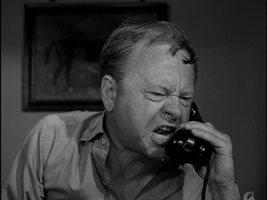 The second audio commentary is one of the strangest things I have ever heard on a DVD. Mickey Rooney is on hand with his one-man show "The Last Night of a Jockey", and it is one odd piece of audio. I'm not sure what is really going on here, so I will not comment on it too much, but observe the following exchanges between Rooney and an interviewer in the booth:
The second audio commentary is one of the strangest things I have ever heard on a DVD. Mickey Rooney is on hand with his one-man show "The Last Night of a Jockey", and it is one odd piece of audio. I'm not sure what is really going on here, so I will not comment on it too much, but observe the following exchanges between Rooney and an interviewer in the booth:
Rooney: (Yelling) HI! THIS IS MICKEY ROONEY! YOU'RE WATCHING THE TWILIGHT ZONE!
Interviewer: Do you remember much about this episode?
Rooney: No. I don't remember anything.
Interviewer: We'll watch it together for the first time.
Rooney: I don't care ... anything about it.
Interviewer: What today's audience doesn't understand, and maybe we can put this in context ... you're playing a jockey but they don't understand that for many years, anytime anybody said anything about a "short", you were the butt of jokes --
Rooney: (Yelling) WELL I'M TIRED OF THAT!
Interviewer: Oh.
(later)
Rooney: Well, it was interesting to make, but I don't see why people enjoy something like this now, but maybe they do. I hope they do.
Interviewer: Had you met Rod ever? Serling?
Rooney: Yeah.
Interviewer: Do you remember where or --
Rooney: No. I don't remember anything about him. I wish I could help you.
Interviewer: What was going on with you when you were making this?
Rooney: (Yelling) I DON'T REMEMBER! IT'S TOO LONG AGO!!
(later)
Interviewer: I was looking for you to explain to the younger audience, because they don't understand --
Rooney: The younger audience doesn't want to see this!
Interviewer: Oh, that's who's watching this.
Rooney: No it isn't!
Interviewer: Yes --
Rooney: They're watching (pause) sex-y things.
I have little comment other than to say that I am glad Image Entertainment had the courage to include it, because it is nothing if not interesting, if albeit for all the wrong reasons.
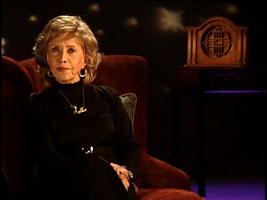 "Living Doll" is accompanied by June Foray, a legend among vocal performers and the voice of "Talky Tina". Most known for characters like Rocky J. Squirrel, Natasha Fatale, Magica De Spell, Jokey Smurf, Cindy Lou Who, and the ubiquitous Looney Tune "Granny", Foray was also the voice of the original "Chatty Cathy" doll that inspired this particular story. She is very lively for a woman of nearly 90 years, and she does many of her famous voices throughout the commentary. While she talks very sparingly about the episode itself, it is interesting to hear her stories of how her career has progressed.
"Living Doll" is accompanied by June Foray, a legend among vocal performers and the voice of "Talky Tina". Most known for characters like Rocky J. Squirrel, Natasha Fatale, Magica De Spell, Jokey Smurf, Cindy Lou Who, and the ubiquitous Looney Tune "Granny", Foray was also the voice of the original "Chatty Cathy" doll that inspired this particular story. She is very lively for a woman of nearly 90 years, and she does many of her famous voices throughout the commentary. While she talks very sparingly about the episode itself, it is interesting to hear her stories of how her career has progressed.
Mariette Hartley, known to many as Zarabeth from "All Our Yesterdays", joins "The Long Morrow", and she has very high praise for Rod Serling, citing how she was so inspired by "Requiem for a Heavyweight" that she invited him to speak to her drama class, and to her surprise, he accepted. Like many of these commentaries, Hartley speaks very little about the episode itself and talks mostly about her career. Some of it is interesting, while some of it just drags. The best parts are when she describes why she is so fond of this unique era of television and laments that it will never come again.
Marc Scott Zicree, author of The Twilight Zone Companion and expert on the series, is back for a second commentary with "Number Twelve Looks Like You". Just as he was with "Death Ship", he is completely prepared and shares all kinds of interesting tidbits about the series as a whole and this specific episode. It's a real shame he wasn't used on other sets or at least other episodes, because his enthusiasm is great, and he could have added a lot to these DVDs. As it is, it is nice to have the two we have, and if you are at all interested in the show, you should listen to this one.
"The Masks" is accompanied by Alan Sues who played the self-involved Wilfred, Jr. Known to many from his work on Laugh-In, Sues is one of the more animated entertainers to lend his memories to an episode. He speaks at length about the challenges and rewards of working for Ida Lupino and then mostly talks about his own career. While animated, he does sometimes stray into rambling territory, but it's still a moderately entertaining listen in spite of it.
The final commentary is the second one by Martin Landau. Previously, he delivered an excellent audio track for "Mr. Denton on Doomsday" despite a relatively small role, and now he has a chance to talk in even more depth as the star of "The Jeopardy Room". Unlike most, he talks specifically about this episode and the many things he remembers about it. It is very clear how fond he is of the series and how closely he pays attention to his own work. As expected, this is one of the best in the set.
RADIO DRAMAS
Once more there are six radio dramas from the Falcon Picture Group, but unlike the fourth season release, these are generally inferior to the originals. The first is an overly long rendition of "A Kind of Stopwatch" (44:58) starring Lou Diamond Phillips as McNulty. Phillips is actually quite good in the lead, and the piece is more humorous than the video presentation. The nods to his catchphrase "You think about that, now!" are especially well done. Unfortunately, the premise is essentially one-note and strains to fill just a 24-minute video script, let alone a 45-minute audio one.
"Living Doll" (32:34) stars Saturday Night Live alumnus Tim Karzurinsky in the part of the wicked stepfather. Initially, he takes on a more likeable and understanding quality than Savalas from the original, but as the story progresses, he gets more aggressive. It is an interesting shift, and it is clear that the new script is intended to show him as trying to be a good father, something a bit lacking from the 1963 version. Another change here is that Tina is more angry and menacing with her voice. While certainly not as strong as the original, it isn't too bad and runs at about the right length.
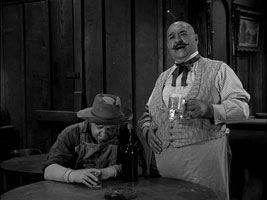 Richard Grieco is in "The 7th is Made Up of Phantoms" (31:01), which is a curious choice as the episode is so incredibly bland. It also depends on some visual information, and the way the radio script tries to compensate comes across as silly. This presentation is no more involving than the original, and Grieco gives a merely average performance. "The Long Morrow" (42:08) takes the initial story and tries to expand the evolution of Douglas and Sandra's love. It's a solid idea, as much of this was glossed over the first time around, but at 42 minutes, it is just too much of the same thing.
Richard Grieco is in "The 7th is Made Up of Phantoms" (31:01), which is a curious choice as the episode is so incredibly bland. It also depends on some visual information, and the way the radio script tries to compensate comes across as silly. This presentation is no more involving than the original, and Grieco gives a merely average performance. "The Long Morrow" (42:08) takes the initial story and tries to expand the evolution of Douglas and Sandra's love. It's a solid idea, as much of this was glossed over the first time around, but at 42 minutes, it is just too much of the same thing.
"Sounds and Silences" (36:27) is another awkward choice for radio. Starring Richard Kind as the naval obsessive, it is near impossible to find perspective on what is taking place when things get very loud or very soft. I suspect that if one was not familiar with the original, he could be quite confused. Kind is solid as the manic and annoying character (he has certainly made a career from it), but on the whole, it just isn't involving. The final radio drama, "Mr. Garrity and the Graves" (35:55), stars Chris MacDonald in the title role, and it plays quite well. Aside from the final sight gag -- which is almost laughably implemented here -- this is the perfect type of dialogue-driven tale to be translated to audio, and it is a successful effort.
As with all the radio dramas on these sets, the six included here range from boring to slightly above average. I would not recommend spending too much time with them unless you are a huge fan of the series.
VIDEO INTERVIEWS
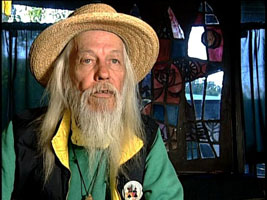 As mentioned, Marc Scott Zicree's audio interviews recorded while researching his book have now been replaced by a plethora of video interviews with those involved with the series. The three principle writers for the show who are still with us each contribute quite a bit of discussion on their work. While these would probably be better off grouped together in a single coherent documentary, they are interesting nonetheless.
As mentioned, Marc Scott Zicree's audio interviews recorded while researching his book have now been replaced by a plethora of video interviews with those involved with the series. The three principle writers for the show who are still with us each contribute quite a bit of discussion on their work. While these would probably be better off grouped together in a single coherent documentary, they are interesting nonetheless.
George Clayton Johnson is on hand in two different settings for the episode "Ninety Years Without Slumbering". Although the story was significantly changed by Richard DeRoy, and not to Johnson's satisfaction, he still has a lot to say about it, and this is as good a place as any for his interview. Here he talks about his original story "Tick of Time" and how (and why) it got changed around before airing. Articulate and intelligent, he has quite a bit to say about Serling's importance in television history and the show in general. The one quote that sticks out is, "'Good enough' wasn't good enough in this show." He also speaks at length about his relationship with the other writers, particularly Charles Beaumont, and what it was like trying to sell scripts as a writer in Hollywood. It is all very interesting material, and it runs close to 25 minutes. Mixed in with his words are a few minutes with on of the episode's stars, Carolyn Kearney. She has a few things to say about Serling and her original experience with "The Time Element", but there is not much substance to it.
Over 30 minutes of material from Earl Hamner, Jr. can be found on his many episodes from the season: "Ring-a-Ding Girl", "You Drive", "Black Leather Jackets", "Stopover in a Quiet Town", and "The Bewitchin' Pool". While none of these episodes is any good, Hamner still has some interesting things to say about the show and his experiences. He relates the tale of how he and Serling had a chance meeting both winning a writing contest all the way back in 1946, and he follows that all the way to his initial involvement with the series. Like Johnson, he spends some time talking about each of the primary writers for the show. He notes, "[The Twilight Zone] had something to say, and it said it entertainingly, it said it forcefully, and it said it lastingly, which are the ingredients of a classic." Also mixed in with his comments are a few minutes each with Michael Forrest on "Black Leather Jackets" and the same with "Nancy Malone" on "Stopover in a Quiet Town". Neither amounts to much.
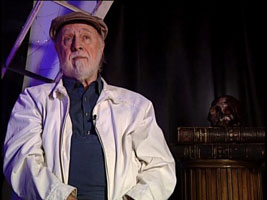 There are almost another 30 minutes with perhaps the best guest writer for the series, Richard Matheson. Often with lead in from interviewer Marc Scott Zicree, he has a decent amount to say on his episodes "Steel", "Nightmare at 20,000 Feet", "Night Call", and "Spur of the Moment". He speaks briefly about Lee Marvin's strong performance as Steel Kelly and Glady Cooper on "Night Call", but most of the time is spent on his classic tale "Nightmare at 20,000 Feet" where he talks at length about the remake in the feature film from 1983, starring John Lithgow. While he was pretty disappointed in the way they changed the core of his story, he does note that the creature effects were much better, laughing that the gremlin in the original looked like a Morlock from The Time Machine. Just like the others, a good portion of time is dedicated to him reminiscing about his experiences with his fellow writers on the show and how uniquely talented each of them was.
There are almost another 30 minutes with perhaps the best guest writer for the series, Richard Matheson. Often with lead in from interviewer Marc Scott Zicree, he has a decent amount to say on his episodes "Steel", "Nightmare at 20,000 Feet", "Night Call", and "Spur of the Moment". He speaks briefly about Lee Marvin's strong performance as Steel Kelly and Glady Cooper on "Night Call", but most of the time is spent on his classic tale "Nightmare at 20,000 Feet" where he talks at length about the remake in the feature film from 1983, starring John Lithgow. While he was pretty disappointed in the way they changed the core of his story, he does note that the creature effects were much better, laughing that the gremlin in the original looked like a Morlock from The Time Machine. Just like the others, a good portion of time is dedicated to him reminiscing about his experiences with his fellow writers on the show and how uniquely talented each of them was.
Three other interviews are scattered throughout the set. Bill Mumy talks about "Long Distance Call", "It's a Good Life" and "In Praise of Pip" for about 7 minutes on the special features for "Pip", but all of it is rehash of his commentaries. June Foray has 12 minutes on "Living Doll", but again, most of it was stuff we already heard before in her commentary. She does have a little fun playing up some of her famous voices. Finally, Terry Becker from "I am the Night -- Color Me Black" speaks for about 5 minutes on his opinion of Rod Serling and his process as a method actor. These last there are not particularly note-worthy and probably not worth your time.
ISOLATED SCORES
Dropping the ball a bit once more, only 10 of the 36 episodes contain isolated scores this time around. This is a serious drop in quantity from previous releases, but fortunately some of the more compelling ones are included here, including Bernard Herrmann's work on "Living Doll". Best of all, two of the more unique pieces are included in their entirety: Jeff Alexander's entrancing folk melodies from "Come Wander with Me" and Henri Lanoe's gorgeous score for "An Occurrence at Owl Creek Bridge".
ROD SERLING: SUBMITTED FOR YOUR APPROVAL
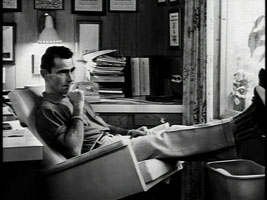 Perhaps the best inclusion for this final release is the much beloved 1995 American Masters documentary. Narrated by Lee Grant, this 83-minute production deftly weaves together Serling's early life, his high-profile career as a writer before and during The Twilight Zone, and what became of him when the show went off the air. Countless key individuals are on hand to give first-hand insight on the man, and many of his writings on the business of television are read in classic Serling style by Mitch Greenberg. The beginning is slightly morbid as it portrays Serling's final moments in heart surgery like the introduction to an episode of his great series, but from that point on, it is a compelling and in-depth look at a man who helped reshape the television landscape forever. Clearly slapped together at the last minute with no DVD menu and chapter stops at rigid 5-minute intervals, the quality of this additional disc isn't particularly good, but it is superior to the videotaped copy I've had for years, and I am very pleased they included it, even if it wasn't done with the greatest of care. This is an absolute must-watch for anyone who is even remotely interested in the series or the man.
Perhaps the best inclusion for this final release is the much beloved 1995 American Masters documentary. Narrated by Lee Grant, this 83-minute production deftly weaves together Serling's early life, his high-profile career as a writer before and during The Twilight Zone, and what became of him when the show went off the air. Countless key individuals are on hand to give first-hand insight on the man, and many of his writings on the business of television are read in classic Serling style by Mitch Greenberg. The beginning is slightly morbid as it portrays Serling's final moments in heart surgery like the introduction to an episode of his great series, but from that point on, it is a compelling and in-depth look at a man who helped reshape the television landscape forever. Clearly slapped together at the last minute with no DVD menu and chapter stops at rigid 5-minute intervals, the quality of this additional disc isn't particularly good, but it is superior to the videotaped copy I've had for years, and I am very pleased they included it, even if it wasn't done with the greatest of care. This is an absolute must-watch for anyone who is even remotely interested in the series or the man.
OTHER MATERIAL
Scattered across the discs are a few final special features. Two more Lectures are included from Serling's time at Sherwood Oaks College. One lasts 6:00 and is included with "Nightmare at 20,000 Feet". Here he laughs about his failed practical joke to shock Richard Matheson with a poster of a monster on the window of a shared flight. He also talks about "Dead of Night", an anthology film where he found a particularly scene with a mirror to be very intriguing. This leads him into a discussion of how the ventriloquist dummy concept, also from the film, has been used to much, which takes him to the Alfred Hitchcock Presents classic "The Glass Eye". Ironically, while he is focused on Jessica Tandy's performance and doesn't see the coincidence himself, the ventriloquist in the episode was played by none other than William Shatner. 12 and a half more minutes of Serling's lectures are included on the final disc under the "Bonus Materials" section. This material is set against the backdrop of rotating photos from the series and from his family archives, and it focuses more on what it's like to try and sell a story, the writing of a pilot, interacting with an agent, and forging through the difficult world of Hollywood.
 | 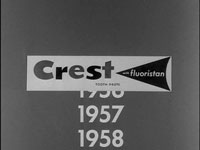 | 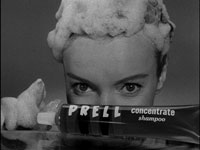 |
A new addition to this set are the Conversations with Rod Serling, recorded during his time at Ithaca College. The first is attached to "An Occurrence at Owl Creek Bridge", where he talks with a group of young writers about crafting an emotional moment and shows them a specific example from the French film. Strangely, the example he shows may be the only piece in this brilliant short that doesn't quite work, but the point stands nonetheless. On the final disc, there are 13 more minutes that cover in even more depth what is like to try and make a living as a writer. The audio/video quality one these lectures and conversations is pretty poor, but it is wonderful that they are included, and they give great insight into what Serling was really like away from the typewriter.
The Museum of Television & Radio contributes 11:24 of highlights from their seminar with a panel that includes his wife Carol Serling, producer and unheralded man behind the success Buck Houghton, producers William Self and Bert Granet, director Lamont Johnson, writers George Clayton Johnson, Earl Hamner, Jr., Richard Matheson, story editor Del Reisman, stars Cliff Robertson, Bill Mumy, Martin Landau, and Earl Holliman, and expert Marc Scott Zicree. As with most of the MT&R seminars, this is a wonderful piece, and I only wish they had included more from the event. At the end is a plea from Jack Bauer to visit the MT&R website: http://www.mtr.org/.
Finally, the last of the "definitive" special features included 2:15 of home video footage from George Clayton Johnson, a wonderful CBS promo by Alfred Hitchcock where he is promoting his new hour-long show that follows The Twilight Zone, 3:43 of wacky billboards ("Milk Wave Lilt: The new home permanent you mix with milk!", "Over, under, around, and true; Pall Mall travels pleasure to you!"), and 61 photos from behind the scenes.
CONCLUDING THOUGHTS:
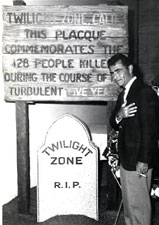 Rod Serling's The Twilight Zone aired its final episode on June 19, 1964, putting to rest one of the most groundbreaking and influential shows in television history. In total, 156 stories were told, expanding our imaginations and examining the nature of our humanity through all its strengths and weaknesses. While the show was never the same after Buck Houghton left, and Serling's scripts by the end indicated just how exhausted and out of ideas he was, there were still some great episodes in this fifth and final season, including classics like "Nightmare at 20,000 Feet" and "An Occurrence at Owl Creek Bridge". This release is not only a step up in episodic quality from the fourth season, but there is a staggering amount of additional features that rivals even the spectacular first season release. By this point in the long journey that has been these reviews, it is unlikely that you need or even desire a summary opinion from me, but for those few who are unsure of what to do with this final release, I Recommend picking it up on the strength of a few great episodes and some wonderful special features.
Rod Serling's The Twilight Zone aired its final episode on June 19, 1964, putting to rest one of the most groundbreaking and influential shows in television history. In total, 156 stories were told, expanding our imaginations and examining the nature of our humanity through all its strengths and weaknesses. While the show was never the same after Buck Houghton left, and Serling's scripts by the end indicated just how exhausted and out of ideas he was, there were still some great episodes in this fifth and final season, including classics like "Nightmare at 20,000 Feet" and "An Occurrence at Owl Creek Bridge". This release is not only a step up in episodic quality from the fourth season, but there is a staggering amount of additional features that rivals even the spectacular first season release. By this point in the long journey that has been these reviews, it is unlikely that you need or even desire a summary opinion from me, but for those few who are unsure of what to do with this final release, I Recommend picking it up on the strength of a few great episodes and some wonderful special features.
Included in the set are the following episodes:
Disc One
Disc Two
Disc Three |
Disc Four
Disc Five
Disc Six |
|
| Popular Reviews |
| Sponsored Links |
|
|
| Sponsored Links |
|
|
| Release List | Reviews | Shop | Newsletter | Forum | DVD Giveaways | Blu-Ray | Advertise |
|
Copyright 2024 DVDTalk.com All Rights Reserved. Legal Info, Privacy Policy, Terms of Use,
Manage Preferences,
Your Privacy Choices | |||||||









